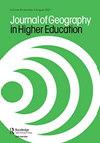新冠肺炎大流行期间地理野外方法课程的教学:反思和经验教训
IF 1
4区 教育学
Q2 EDUCATION & EDUCATIONAL RESEARCH
引用次数: 8
摘要
摘要实地教育是互动的、动手的,基于现实世界的经验和方法,在新冠肺炎大流行期间,它面临着特殊的挑战。由于许多机构可能难以维持地理教育的这一重要组成部分,本资源文件旨在说明疫情的影响,并提供一些策略,以克服德克萨斯州一所大学教授实地方法课程的经验带来的挑战。虽然许多研究都集中在评估疫情期间的现场教学,但我们的评论既集中在教师和学生的基础认知上,也集中在疫情爆发前后的比较上。我们发现,虚拟出勤对教学不利,团队合作和沟通等可转移技能也因社交活动的减少而受损。然而,观察、记笔记和组织等个人技能在学生的学习中更受欢迎。考虑到安全和健康协议的一致性,学生们对校园实地调查的安全问题表示担忧。根据现有文献和我们的经验,我们最后提出了四条一般性建议,与处于类似情况的同事分享,希望有助于在混乱的情况下保持实地教育的关键作用。本文章由计算机程序翻译,如有差异,请以英文原文为准。
Teaching a geography field methods course amid the COVID-19 pandemic: reflections and lessons learned
ABSTRACT Field-based education is interactive, hands-on, and based on real world experience and methodology, and during the COVID-19 pandemic, it has faced special challenges. As many institutions may struggle to maintain this vital component of geographic education, this resource paper aims to illustrate the impacts of the pandemic and provide some strategies to overcome the challenges from the experience of teaching a field methods course at a university in Texas. While many studies have focused on evaluating field instruction amidst the pandemic, our commentary focuses on both a ground-based perception from instructors and students and a comparison before and after the outbreak of the pandemic. We found that virtual attendance is disadvantageous to teaching and learning, and transferable skills like teamwork and communication are compromised due to a reduction in social interaction. However, intrapersonal skills such as observation, note-taking, and organization were better received in students’ learning. Students expressed minimal safety concerns about the on-campus fieldwork given the conformity to the safety and health protocols. Based on the existing literature and our experience, we conclude with four generalized recommendations to share with colleagues in a similar situation, hoping to help retain the critical role of field-based education even under disruption.
求助全文
通过发布文献求助,成功后即可免费获取论文全文。
去求助
来源期刊

Journal of Geography in Higher Education
Multiple-
CiteScore
5.80
自引率
9.50%
发文量
29
期刊介绍:
The Journal of Geography in Higher Education ( JGHE) was founded upon the conviction that the development of learning and teaching was vitally important to higher education. It is committed to promote, enhance and share geography learning and teaching in all institutions of higher education throughout the world, and provides a forum for geographers and others, regardless of their specialisms, to discuss common educational interests, to present the results of educational research, and to advocate new ideas.
 求助内容:
求助内容: 应助结果提醒方式:
应助结果提醒方式:


